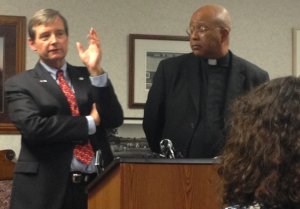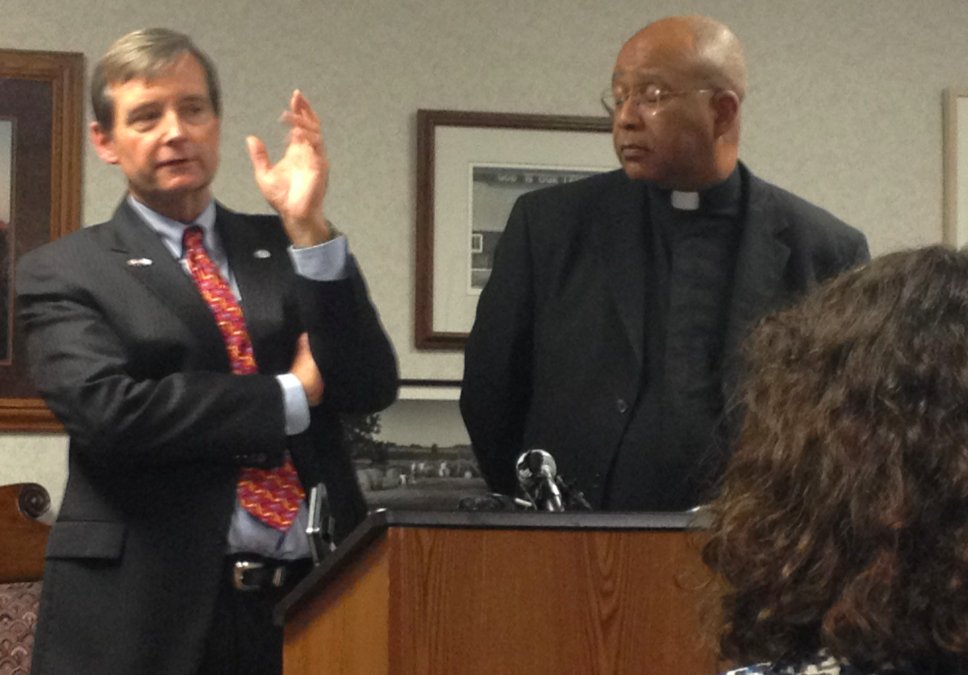MINNEAPOLIS (AP) — A member of a task force reviewing issues related to allegations of clergy sexual misconduct in the Archdiocese of St. Paul and Minneapolis said Wednesday that he was sickened by reports suggesting church officials mishandled accusations against two priests, and he wants to make sure it doesn’t happen again.
“If the Catholic Church doesn’t fix this problem, its ability to act as a force of good in the world … is over,” said Brian Short. “This is a problem that needs to be fixed now, and fixed correctly.” 
Short, a former legal mediator and U.S. magistrate, is among six members of a lay-person task force that will review how church officials dealt with accusations of priest misconduct.
Archbishop John Nienstedt created the task force as the archdiocese faces scrutiny for its handling of two priests — after one went on to molest two teens despite documents suggesting church leaders knew he had a sexual addiction, and after recent revelations that pornographic images, including some that appeared to be underage boys, were found on another priest’s computer in 2004 and never revealed.
The task force will examine archdiocese documents related to policies and procedures for preventing, investigating and responding to sexual misconduct by clergy. It will also interview current and former employees, and if it sees fit, victims of abuse and accused clergy members.
The Rev. Reginald Whitt, a Dominican friar, was appointed to assemble the task force. He will not be a member, but will act as a go-between for the group and the archdiocese. He will take the group’s final recommendations and make the report public.
Whitt said the work won’t be easy, but must be done “to restore trust in those who govern the archdiocese and the confidence and integrity of our clergy, and most especially it must be done to restore the safety of our children.” He said recent allegations in the media depict things that are “sickening.”
“They’re despicable. They break our hearts,” he said. “They undermine the Catholic people’s trust in their pastoral ministers.”
Nienstedt first mentioned the creation of the task force on Sept. 27, nearly a year after the Rev. Curtis Wehmeyer was convicted of sexually abusing two brothers at a St. Paul church. Whitt was tasked with pulling together the task force days after Nienstedt’s top deputy stepped down and another priest was accused of possessing child pornography years ago.
In addition to Short, other task force members include a former St. Paul police sergeant and computer forensics expert, and a licensed psychologist who has worked in the area of sex offender assessment and treatment.
David Clohessy, national director of SNAP, the Survivors Network of those Abused by Priests, said the task force won’t make a difference.
“The problem is the behavior of church officials, not the policies and procedures on paper,” he said.
Whitt acknowledged the church already has policies, but said media reports suggest some people didn’t follow them. Whitt and Short stressed the need for a compliance program and audit mechanism to ensure policies are followed.
“There is some urgency to this,” Short said. “I believe that there is a commitment on the part of everyone to fix this problem.”
The Archdiocese of St. Paul and Minneapolis is home to about 825,000 Catholics and encompasses 188 parishes in 12 counties.




Rev. Reginald Whitt, professor of canon law at University of St. Thomas in Minneapolis – Director of Task Force, Archdiocese of St. Paul and Minneapolis
“Canon law is very eloquent on what a bishop is supposed to do, but there is no list of Thou Shalt Nots,” says Father Reginald Whitt (2002). “These (sex abusers) are criminals, but they are our criminals and we can’t lose them. Indeed, the bishops have a duty to try to save them,” says the Rev. Reginald Whitt, professor of canon law at University of St. Thomas in Minneapolis. (2002)
“……BISHOPS HAVE A DUTY TO TRY TO SAVE THEM (sex abuser priests)…..” Well, Fr. Whitt, where is it written (no, not in text or canon law…….it is written in one’s heart and soul) that the bishops have a duty to try to save the CHILDREN ABUSED and INNOCENT CHILDREN from the risk of abuse?
Father Whitt has a degree in canon law and civil law. Which perspective will take prominence and priority when he reviews the findings of the task force committee he established to review the debacle in the archdiocese? It is humanly, ethically and morally IMPOSSIBLE to avoid/resolve the conflicts of interest from both perspectives (civil and canon law) when attempting to review and support the rights of priests vs the rights of child victims.
Michael Skiendzielewski
Captain (retired)
Philadelphia Police Dept.